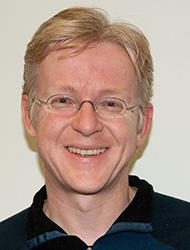Hans Gellersen - Eye Movement for Ubiquitous Computing
- Keynote Speech

Hans Gellersen is a Professor of Interactive Systems at Lancaster University in the UK. His research is focused in ubiquitous computing and human-computer interaction. His specific interests are in interaction with mobile and pervasive devices, sensing of human activity and context to support such interactions, and generally the coupling of digital technology with artefacts and activity in the world. He was involved in the foundation of the UbiComp conference series, which over the last 15 years developed into the field's leading venue. He also serves on the Editorial boards of Personal and Ubiquitous Computing and IEEE Pervasive Computing. He has held his chair position at Lancaster since 2001. Previously he was affiliated with the University of Karlsruhe in Germany, where he also received his PhD in Computer Science in 1996.
Ubiquitous computing aspires to support human activity seamlessly with interactive technologies. This involves the proliferation of digital devices of different form and function in our environments, and the appropriation of diverse sensing modalities to observe activity, capture context, and provide natural interfaces to users. In this talk I will propose eye movement as a modality for ubiquitous computing, as the eyes are where the action is. While eye tracking has been long established for diagnosis and gaze control in human-computer interaction, I will argue that eye movement can be leveraged in novel and advanced ways, both as source of contextual information about users, including their health and well-being, and as a channel for communication and interaction. I will illustrate this with examples that explore eye movement analysis for activity recognition, the use of smooth pursuit eye movement for calibration and interaction, and the multimodal combination of gaze and touch. I will close with an outlook toward serious application of eye movement for health monitoring.




